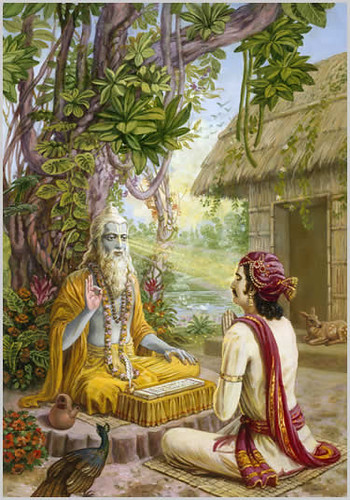From verses and purport to 1.1.4 to 1.1.8
Character
Character
- A gosvāmī, or the bona fide representative of Śrī Vyāsadeva, must be free from all kinds of vices before he can dare sit on the vyāsāsana. The four major vices of Kali-yuga are (a) illicit connection with women, (b) animal slaughter, (c) intoxication, (d) speculative gambling of all sorts.
- He should be spotless in character.
- He should be very much obedient and (snighdha)submissive to his bona fide spiritual master and always ready to satisfy his spiritual master.
- Saumya- pure and simple
- He should be able to hear and explain them, which is more important than just reading them.
- Good hearing and chanting by which the real meaning of scripture awakens in the heart.
- Follows sincerely, is convinced and can therefore explain sincerely
- He should be conversant in all systems of philosophy, namely Gautama, Kaṇāda, Kapila, Patañjali, Jaimini and Aṣṭāvakra so that he can present fully the theistic views of the Bhāgavatam in defiance of all other systems.
- They must be in the disciplic succession
- Respect for the speaker
- Asks questions with the intention of applying - this means submission and respect for the teacher
- Always in the mood of being a disciple- always trying to follow. A good leader is a good follower
Some points from 10.1.4
Qualifications of speaker and receiver:
- A devotee is one who has no other motive for reciting Bhagavad-gītā and Śrīmad-Bhāgavatamthan to serve the Lord.
- Śukadeva Gosvāmī epitomizes the proper reciter for Śrīmad-Bhāgavatam, and Parīkṣit Mahārāja, who purposefully left his kingdom and family prior to meeting death, epitomizes the person fit to hear it. A qualified reciter of Śrīmad-Bhāgavatam gives the right medicine (bhavauṣadhi) for the conditioned souls.
- A Vaiṣṇava is nivṛtta-tṛṣṇa; that is, he has no material purpose, for his only purpose is to preach Kṛṣṇa consciousness
- The word paśu-ghnāt is important in this connection. Paśu-ghna means “butcher.” Persons fond of performing ritualistic ceremonies for elevation to the higher planetary systems must offer sacrifices (yajñas) by killing animals. Butchers cannot be interested in Kṛṣṇa consciousness, for they are already materially allured.
- Anyone who is not Kṛṣṇa conscious and who therefore does not engage in the service of the Lord is also paśu-ghna, for he is willingly drinking poison.
- For kṛṣṇa-kathā, topics about Kṛṣṇa consciousness, there must be a speaker and a hearer, both of whom can be interested in Kṛṣṇa consciousness if they are no longer interested in material topics.
- For topics concerning Uttamaśloka, the Supreme Personality of Godhead, the spiritual master speaks, and the disciple hears with attention. Unless both of them are free from material desires, they cannot be interested in topics of Kṛṣṇa consciousness.
- The spiritual master and disciple do not need to understand anything more than Kṛṣṇa because simply by understanding Kṛṣṇa and talking about Kṛṣṇa, one becomes a perfectly learned person (yasmin vijñāte sarvam evaṁ vijñātaṁ bhavati, Muṇḍaka Upaniṣad 1.3).

No comments:
Post a Comment